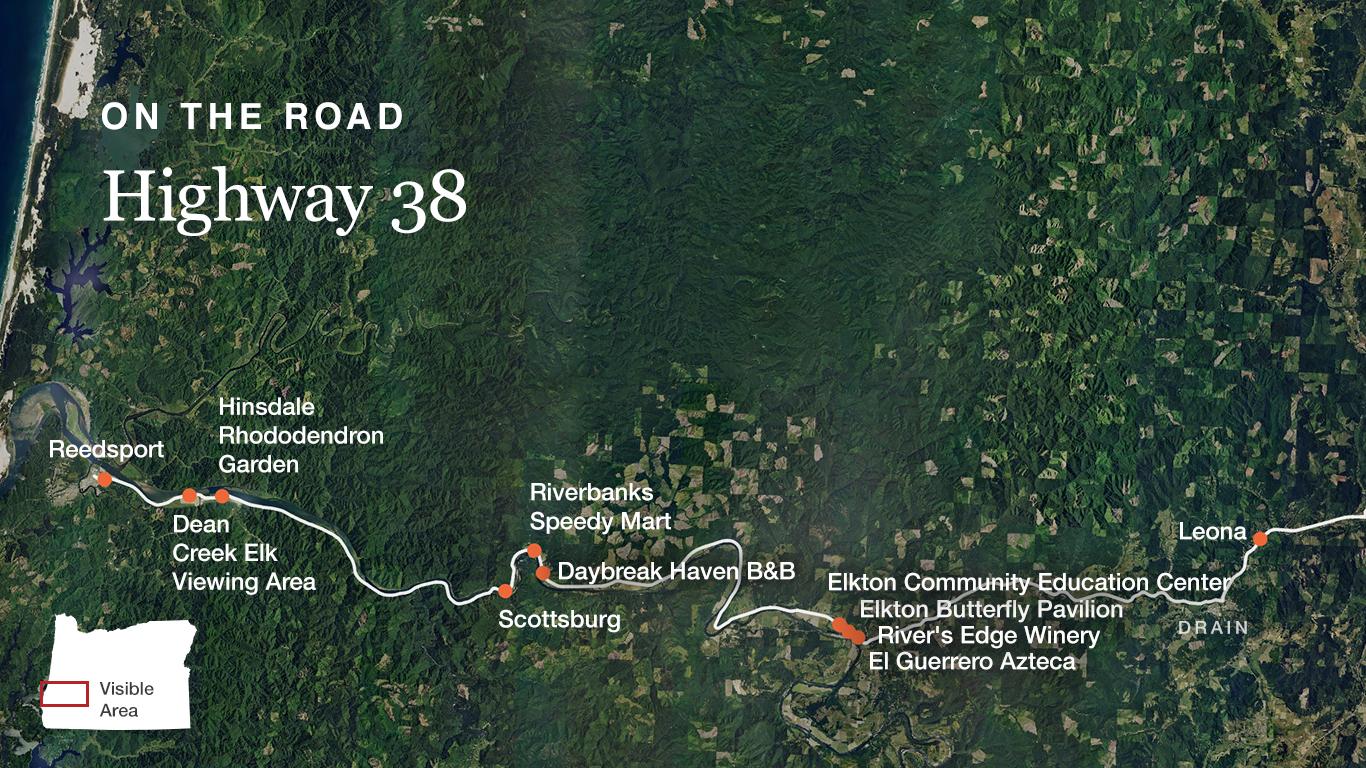
Jason Bernert / OPB
On The Road is "Think Out Loud’s" radio road trip series: conversations with wanderers, tourists and residents along Oregon’s backroads and highways.
Oregon Route 38 is a sleepy stretch of road cutting from Interstate 5 out to the coastal town of Reedsport. The area is home to a burgeoning wine scene, tranquil vistas along the Umpqua River and quiet retirement communities.
We recently took a drive along Route 38, meeting longtime residents, a few new arrivals and some folks who were just passing through. We talked to high schoolers and retirees, people who came to the area to settle down, those who’ve stuck around despite never imagining they’d stay, people making their dreams come true — and those hoping for something more.
Stop One: Leona
Near the unincorporated community of Leona, we passed a house with a big trampoline in the side yard. A little girl was bouncing and flopping on it. We knocked on the door and Carla Booher let us in. She lives there with her husband, Rudi, their six biological children and three adopted children they met when volunteering at an orphanage in Bolivia.
“We didn't expect to adopt, but we had to once we fell in love with the babies. These kids just wormed their ways into our hearts.”

Three of Carla and Rudi Booher's children play in their home.
Dave Blanchard / OPB
Booher said raising nine children has taught her how to better appreciate the present moment.
“With each of my babies, I’ve just held them more, loved on them more, just savored the moment, really, more than my first one. The first one, you’re like ‘can’t wait for them to talk! Can’t wait for them to walk.’ And the next one is like 'Oh, but they do that forever,' and I’m just savoring the baby babble and the drool and the midnight feedings and whatever a lot more.”
Stop Two: Elkton Community Education Center
Further down the highway, the road met up with the Umpqua River at the small town of Elkton. We pulled into the Elkton Community Education Center, home to a native plant garden, a community library and a replica of historic Fort Umpqua.
Just outside the walls of the fort we ran into Celina McRae, an AmeriCorps volunteer who was pulling weeds in the onion beds. She’s from New York City, and Elkton felt like a big change.
“It's different, but I guess it's cool though to just be in a small community where everyone knows everybody, instead of being in New York where I'm walking past strangers every day. Here I think I've probably had a conversation with everybody that lives around here.”
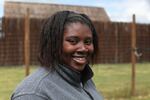
Celina McRae is an Americorps volunteer from New York City.
Dave Blanchard / OPB
She dropped out of high school when she was 17 because her grandmother was diagnosed with cancer, and her family needed her help. Now she’s hoping to get back on track and become a corrections officer.
“Just to help," she said. "Because I think people always think like, ‘OK you’re in jail, so you’re a bad person.’ And I feel like people get treated really bad when they’re in jail. Not saying that ... they shouldn’t be there. But ... I guess it’s just to help."
Stop Three: Butterfly Pavilion
Another feature of the community center is the butterfly pavilion. It’s taken care of by Barbara Slott, the butterfly steward. She’s a wildlife biologist, but she hasn’t always been interested in butterflies.
Slott originally studied large ungulates, like elk and moose. But she was tapped by the community center to volunteer in the pavilion, and she became interested in the problems facing monarchs.
“Monarch populations are down 80 percent worldwide … and so I think it's important that we, as humans, who have seemed to have had the most impact on monarch populations, do what we can to help bring them back.”
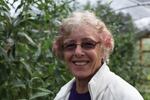
Barbara Slott is the butterfly steward at Elkton Community Education Center.
Dave Blanchard / OPB
She and her husband wound up in Elkton after selling their home and hitting the road in an RV.
“At first the concept seemed so foreign, because how can you not have a house?" Slott said. "I mean everybody has a house or an apartment or some permanent place to stay. But the more we read about it and the more we thought about it, and thought about, ‘You know, I’m not attached to this house; I’m not attached to the furniture; and quite frankly, it was really the only way that we could afford to retire when we did. So we bought ourselves a big fifth wheel and a pickup truck. And when we were both retired, we hit the road.”
Stop Four: River's Edge Winery

Bottles of wine sit in the backroom of River's Edge Winery.
Dave Blanchard / OPB
Elkton is also home to a nascent wine scene, still struggling to get out from under the shadow of the more recognized Willamette Valley to the north.
One of the first wineries in the area was opened by Mike Landt. He went to the University of Oregon, and then left for St. Louis to work as a biochemist. But he and his wife missed Oregon and figured they could try their hand at winemaking. It’s been a challenge.
“Well, you know, the saying in the wine business is ‘to make a small fortune in the wine business, you start with a large one,'” he said.
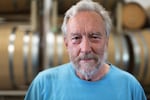
Mike Landt owns River's Edge Winery in Elkton.
Dave Blanchard / OPB
River’s Edge has a simple approach, Landt says. Grapes, yeast, sulfites and a trace of copper. “A typical California wine might contain up to 17 ingredients,” he said. His approach is to let nature take the lead.
“The Oregon tradition is that wines are made in the vineyard, not in the winery. The responsibility of the winemaker is to not screw it up.”
Landt works with Tyler Bradley, the son of his former business partner, John Bradley. Bradley grew up in a farmhouse his dad built in the vicinity. He went to college at Oregon State University and then left for a job in Chicago and Indianapolis. He traveled around the world for a while, but he was always in talks with his dad about coming home to run the business.
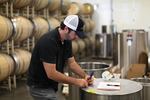
Tyler Bradley is a winemaker and the manager of Bradley Vineyards.
Dave Blanchard / OPB
In January 2014 John Bradley passed away. And Tyler felt called back to Elkton.
"Bradley Vineyards was kind of [Dad's] dream. He was one of the last pioneers of the area,” he said.
Tyler didn’t want to see that dream die. But when he came back, he was petrified that he wouldn’t know what to do. Luckily, he had Mike Landt and Mike's wife, Vonnie, as mentors.
“I just love learning from them. I have transitioned from the ‘It’s scary. What am I doing?’ to ‘Holy cow, I think I can make this work and I can innovate and I can build,’ and that’s what Dad originally wanted me back here to do.”
For his part, Landt said he was happy to have another Bradly to work with. “John Bradley was my best friend, and I was very sorry to see him go … and so his passing left a hole in things that Tyler has gone a long way to help fill.”
Stop Five: El Guerrero Azteca

Geraldo Aguirre is from Guerrero, Mexico, and moved to Oregon 16 years ago. He used to have a restaurant in Morro Creek, California, but two years ago he opened up El Guerrero Azteca – a Mexican food cart in Elkton. Business is good so far. It’s the only Mexican restaurant in town. Carne asada tacos, carnitas burritos and chile verde burritos are among the best-sellers.
Dave Blanchard / OPB
Before heading out of Elkton, we stopped by the El Guerrero Azteca food truck, where we ran into high school students Brooke Ashley Sweet and Emma Krystyne Burke. They told us about what they were planning to do after graduation.
Sweet said she was hoping to become an ultrasound technician. "I don’t do so well with blood, so I think it’s cool to look inside the body without opening it," she said. For Burke, the plan is to go off to Western Oregon University to major in accounting and minor in psychiatry. "I have, like, everything planned out."
Neither told us they wanted to stay in Elkton. Sweet said she might like to try out California, but Burke wanted to stay in Oregon. “It’s way more beautiful than any other state.”

Brooke Ashley Sweet, left, is a junior and Emma Krystyne Burke, right, is a sophomore at Elkton High School. They come to El Gurrero Azteca for lunch once a week or so.
Dave Blanchard / OPB
But life plans weren’t what they were talking about when we came in. “We were talking about boys, mostly.” But not Elkton boys.
“Everybody here knows each other. We’ve pretty much all dated each other already,” Sweet said.
So they had set their sights on boys from surrounding towns, like Oakland, Drain, and Yoncalla.
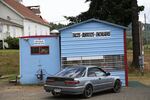
El Gurrero Azteca opened two years ago in Elkton.
Dave Blanchard / OPB
Stop Six: Scottsburg
Outside of tiny Scottsburg, we passed by Harry Hoffman’s house. He was working in his yard, right on the edge of the highway’s shoulder.
“I'm trying to pull up the weeds on the highway and replace it with some lupines and kind of make some color on the highway. I'm into aesthetics.”
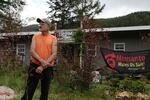
Harry Hoffman stands outside his house on Oregon Route 38.
Dave Blanchard / OPB
Hoffman has two giant banners up. One is a Donald Trump sign, the other says “Monsanto Makes Us Sick!”
“Monsanto, yeah, the big guns. I don’t see that they’re for our benefit. It’s corporate! And corporate likes to make lots of money. Whether or not it’s at our expense. … As far as the other sign — Trump — I don’t even know if he’s necessarily the answer, but with everything going on, this country needs to take a different course, hopefully, because freedoms are being eroded if they aren’t already all gone ... but again he’s big money too, so is he in it for us? The small guys? I hope so. I’m questioning it at best."
He just moved here from Medford, and while he told us that he liked his new home, there were some drawbacks. For one, he didn't love the speed of traffic on the highway outside his house. But he told us about a solution he had for that problem.
“I’ve thought about putting a highway patrol car out here — one of the ones they retire — buy one for $500 and park it.”
There’s another risk living in really rural areas, he said.
“You get the crackpots, but I think I’m a crackpot too, so whatever.”
Stop Seven: Daybreak Haven Bed & Breakfast
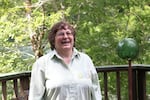
Shelley Ryan stands on the back porch of Daybreak Haven Bed & Breakfast.
Dave Blanchard / OPB
Shelley Ryan runs Daybreak Haven B&B with her husband, Pat. Scottsberg seems like an off-the-beaten-path destination, yet they’ve had guests from Vietnam, Germany, Iceland, Russia and China. She didn’t understand why they were getting so much international interest until one of her guests explained it.
“We were just kind of told we were in the middle of everything. Originally I thought we were in the middle of nowhere, but they told me were in the middle of everything.”
They meant that Scottsburg was a perfect halfway point for people making the trip from Seattle to the redwoods or Portland to San Francisco.
When Ryan isn’t running the bed-and-breakfast, she’s either working at the post office or eavesdropping on the anglers on the river. She set up a two-way radio on her deck that lets her listen to the activity on the river to hear if the fish are biting. But it also picks up on her neighbors’ conversations.
"They tell me how many they caught, how big they are. We also hear comments about their wives, their girlfriends. I know everything in this town."
Stop Eight: Riverbanks Speedy Mart
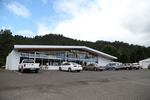
The Riverbanks Speedymart in Scottsberg
Dave Blanchard / OPB
David Gerardo mans the till at Riverbanks Speedy Mart. He came to Scottsburg from Los Angeles in 2004 to take care of his ailing parents and has been here much longer than he thought he’d be. He makes minimum wage at the store, but he still appreciates the job.
“This is my solace. I come here to talk to people and smile and be happy. At home it's not like that.”
He misses the culture, restaurants and concerts in L.A. “It’s like God’s waiting room up here.”
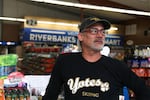
David Gerardo works at the Riverbanks Speedy Mart.
Dave Blanchard / OPB
His dad passed away a few years ago. And his mom has chronic obstructive pulmonary disease and emphysema. He had his piece of advice for anyone needing to care for their aging parents: “have someone else do it.”
“You’re no longer parent and child. You become a caregiver … because you can’t function upset, so you have to just move forward. So you kind of cut the emotions off. Otherwise, you cry all the time. It’s a horrible experience. My dad was in diapers, in a wheelchair. We had to bathe him, feed him, move him around. It’s not good. I don’t recommend it."
Stop Nine: Dean Creek Elk Viewing Area
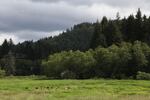
Elk lounge in the grass in the Dean Creek Elk Viewing Area.
Dave Blanchard / OPB
Stuart Love is the district wildlife biologist with Oregon Department of Fish and Wildlife. He’s in charge of managing the elk population at Dean Creek Elk Viewing Area, where there’s a resident population of Roosevelt elk that tourists can see from the road. Love finds the creatures fascinating.
“One of the things about Roosevelt elk that's different than other elk is they're basically not migratory. They're homebodies. They live in a really small area — a couple of square miles, something like that. And they spend their entire lives in those areas.”
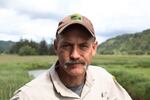
Stuart Love manages the elk population at Dean Creek Elk Viewing Area
Dave Blanchard / OPB
When the elk population gets too big, Love issues hunting permits. And he might grab one of those tags himself.
“Wildlife management has its roots in hunting, really. If you think about the way animals are managed in North America, hunting is one of the primary things we use for controlling populations, so hunting goes hand in hand, absolutely, with management.”
The best way to prepare them? “Barbecuing elk steaks, I imagine.”
Stop Ten: Hinsdale Rhododendron Garden

A rhododendron blooms at the Hinsdale Rhododendron Garden outside of Reedsport.
Dave Blanchard / OPB
Across the highway from the elk viewing area, there was a pull-off to a small garden. It was filled with blooming rhododendrons and azaleas. It was the former property of O.H. Howard Hinsdale. He owned a bank in Reedsport, along with the Umpqua Sand & Gravel. And he had an obsession with rhododendrons.
Megan Harper is a public affairs officer with the Bureau of Land Management in Coos Bay. She explained how Hinsdale went about making his paradise.
“He would drive around Portland, and if he saw a cool rhododendron in someone's yard, he would go up and knock and offer them however much money it took to go and buy it from them, dig it up and bring it down here.”

Megan Harper is a public affairs officer with the Bureau of Land Management.
Dave Blanchard / OPB
He collected hundreds of plants, although maintaining the property proved challenging. He ended up depending on his sand and gravel company to do some serious landscaping.
“He had to keep building up the island, as well as the house — it was on stilts because it just continuously flooded, so I imagine it took a lot of work to keep this place from just wanting to turn into a riverbank.”
Stop Eleven: Reedsport
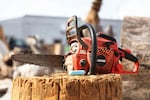
A chainsaw sit atop a stump at Rex Byers' woodshop in Reedsport
Dave Blanchard / OPB
Continuing down the highway, we reached Reedsport, the end of our stretch of road. As we drove through downtown, we passed by a store with a number of carved animals out front. A man in the workshop next door was working on a new piece. We pulled over to talk to him. His name is Rex Byers, and he told us what he was working on — a puppy dog.
“I just did the mouth, the nose, the eyes — kind of starting to give him some character there.”
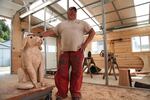
Rex Byers is a semi-professional chainsaw carver in Reedsport.
Dave Blanchard / OPB
Byers described the puppy dog as a "he," although he was not strictly anatomically correct. “I kind of don’t like being gender specific when I carve. It kind of gets weird.”
Puppy dogs aren’t in high demand as a chainsaw artist. In fact, there’s really only one animal that people are interested in.
“Everybody wants a bear. … That is what everybody wants. They want a bear on their front porch. They want a welcome bear. They want a bear holding their mailbox. I mean, you name it. They want a bear with an Oregon State T-shirt on it. … You'd think they'd want a beaver with Oregon State, but no — they want a bear with an Oregon State T-shirt. I mean it's just crazy. Everyone wants a bear.”
